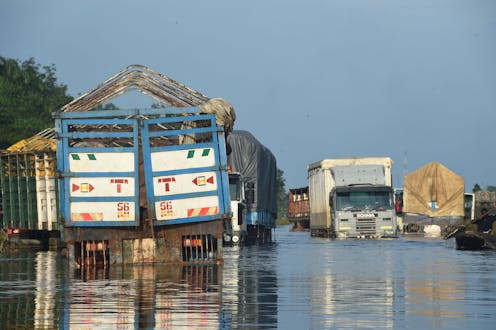
Climate change is not just a buzzword or a topic for political debates. It is a real and pressing issue that affects every aspect of our lives. The effects of climate change are already being felt worldwide, from rising sea levels to heatwaves, droughts, floods, loss of biodiversity, food insecurity and more.
In Nigeria, climate change has contributed to the country’s mounting economic and social challenges. The country has acknowledged the need to move to a low-carbon future. Yet climate change was largely absent from the 2022 presidential campaign manifestos.
The newly elected government, led by Bola Ahmed Tinubu, faces numerous immediate challenges. Among them are widespread violence and insecurity; high inflation and currency depreciation; and a mounting debt burden.
But climate change cannot be ignored. It has directly contributed to Nigeria’s crises. For example, extreme flooding in 2022 displaced 1.4 million people and fuelled food inflation.
Read more: Nigeria floods: 4 ways they affect food security
Extreme heat and erratic rainfall, both consequences of climate change, have intensified resource competition between farmers and herders, leading to communal clashes.
Read more: Herder-farmer conflict in the Sahel needs a new description: why 'eco-violence' fits
As a disaster risk reduction and climate change adaptation expert, I argue that climate change should be central to government’s planning. This is to prevent future infrastructure damage, create economic opportunities, and provide various social and environmental benefits.
Nigeria’s new government should take action on climate change, even amid all the other pressing issues. Much of this action concerns the move from reliance on fossil fuels to cleaner energy sources, often referred to as the energy transition.
Nigeria is a major hydrocarbon producer and holds the largest natural gas reserves on the continent. It therefore has the potential to play a significant role in shaping how countries manage a transition away from hydrocarbon fuels to cleaner energy sources such as solar, wind and hydro power.
Although Nigeria’s dire public finances limit its ability to invest in renewable energy, the government can still take steps. It has made a start with removing fossil fuel subsidies. Other steps, which research has shown to be working in Morocco and Rwanda, could be:
effective flood risk management
tax and duty exemptions for components used in solar solutions
adapting existing initiatives in the power, agriculture and transport sectors to promote clean energy
prioritising infrastructure projects that will attract private investment in the energy transition.
Solutions
Before 2018, renewable energy generation equipment was eligible for tax exemptions. But the tax breaks ended, resulting in higher retail prices for solar solutions. A study by the African Clean Energy Technical Assistance Facility calculated that the benefits of cheaper solar products (energy access and job creation) would have outweighed the tax revenues forgone.
The new president could reinstate the incentives for solar products.
The government should also act urgently to manage flood risks. It could invest in awareness campaigns to educate citizens on the dangers of flooding and how to prepare and respond to flood events.
Read more: What Nigerian cities can do to cope better with flood risk
Sustainable urban planning and land-use management can make urban areas less vulnerable to flooding. This involves enforcing building codes and zoning regulations, safeguarding natural buffers such as wetlands, and using green infrastructure to manage stormwater runoff.
Read more: Wetlands do the job of expensive technology, if we let them
Thirdly, the government can review existing initiatives in the power, agriculture and transport sectors to advance climate action at a modest cost. For example, the Presidential Power Initiative is a partnership between the Nigerian government and Siemens Energy AG to upgrade energy infrastructure. It’s an opportunity to enable the integration of renewable energy. The new administration should honour the agreements signed and continue to fund them.
The government can also upskill smallholder farmers on climate-smart agriculture methods. These include adopting flood- and drought-tolerant seed varieties, installing early warning systems for weather, and training farmers to improve land productivity.
Read more: Climate pioneers: how small farmers could be leading the way towards sustainable agriculture
A fourth area where government could act on climate is infrastructure for the energy transition. For example, investing in modern grids that encourage private investment in solar and wind power.
The government can also partner with multilateral institutions and development banks to mobilise the finance for climate action.
Read more: COP27 in review: climate talks delivered big gains for Africa, but also several challenges
The African Development Bank’s Desert to Power initiative, which aims to build a 10GW solar park across the Sahel region of Africa, including Nigeria, presents an opportunity for the government to attract investment in the country’s renewable energy sector.
Finally, the government must recognise the significance of the climate crisis and the challenges it poses to Nigeria’s development. Climate action must be coordinated across sectors and integrated into all government policies.
Climate strategy
The government can also engage with civil society organisations, academia and the private sector on climate strategy.
Read more: Why Nigeria's religious leaders should learn more about climate change
Such a strategy could guide the country’s transition to a low-carbon economy and the allocation of resources to climate action.
The energy transition is an opportunity for Nigeria to diversify its economy, reduce its reliance on fossil fuels, and create new job opportunities. Climate action can help to address some of Nigeria’s most pressing challenges, such as frequent flooding, food insecurity, poverty and inequality.
Olasunkanmi Habeeb Okunola is a Visiting Scientist at the United Nations University, Institute for Environment and Human Security (UNU-EHS).
This article was originally published on The Conversation. Read the original article.







